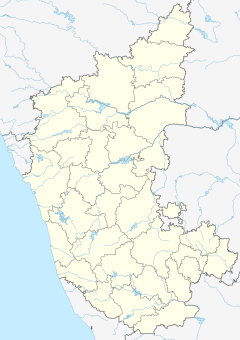Kotilingeshwara
This article needs additional citations for verification. (December 2019) |
| Kotilingeshwara Temple | |
|---|---|
 | |
| Religion | |
| Affiliation | Hinduism |
| Deity | Shiva |
| Festivals | Mahashivaratri |
| Location | |
| Location | Kammasandra, Kolar |
| State | Karnataka |
| Country | India |
 Location in Karnataka | |
| Geographic coordinates | 12°59′42.6114″N 78°17′41.2542″E / 12.995169833°N 78.294792833°E |
Kotilingeshwara Temple (Kannada: ಕೋಟಿಲಿಂಗೇಶ್ವರ) a temple in the village of Kammasandra in Kolar district, Karnataka, India. The presiding deity of the temple is Lord Shiva. The temple has one of the largest Shivalingams in the world.[1]
Background Information[]
Before Kammasandra village was known as "Kammasandra" it was known as "Dharmasthali" and was where Manjunatha Sharma (CE 788-827) aka. Bhakta Manjunatha lived. Bhakta Manjunatha was born in Dharmasthali to a family of Shaiva Brahmins and was always a man of good character, but was an atheist who insulted Lord Shiva ever since he was little. He ran a local wrestling school and participated in vigilantism instead of working in his family's catering business and participating in religious traditions. Later in his life, he realized the divinity of Lord Shiva and became an ardent devotee of Lord Shiva. Then, one day when Bhakta Manjunatha and his family visited the local Lord Shiva temple, a few incidents occurred which were interpreted as bad omens and every single holy deepa (incensed lamp) in the temple [2] premises became unlit. The other temple-goers then accused Bhakta Manjunatha as the cause. Nevertheless, Maharaja Ambikeshwaravarma, a local viceroy for the ruling Rastrakuta Dynasty and another Shaiva devotee, happened to be in attendance when that happened and quickly quelled the mob. He then approached Manjunatha to prove his innocence by making every lamp glow again. Bhakta Manjunatha sang the devotional song Mahaprāņa Deepam composed by Mahārishi Vyasa and made them glow brighter than ever before. Everyone realized that Manjunatha was a changed man and was the greatest devotee of Lord Shiva. He is believed to have insulted Lord Shiva ten million times in his lifetime. Therefore, to acquit himself of his past sins, Bhakta Manjunatha, under the patronage of Maharaja Ambikeshwaravarma and the help of his family, created ten million lingas and consecrated them. Hence the name Kōtilingeshwara, where Kōti means crore and installed them in the area now known as Kōtilingeshwara Temple. The temple structures themselves were built by Swamy Sambhashiva Murthy in 1980. The entire story of Bhakta Manjunatha was captured into a critically acclaimed bilingual feature film titled Sri Manjunatha by producer Nara Jayasridevi and director K. Raghavendra Rao.
The main attraction of the temple is a huge linga measuring 108 ft (33 m) tall and 35 ft (11 m) tall Nandi idol, surrounded by lakhs of small lingas spread over an area of 15 acres (61,000 m2). The Nandi idol is installed over a platform which is 60 feet (18 m) in length, 40 feet (12 m) in width and 4 feet (1.2 m) in height. There are eleven small temples constructed within the premises for various deities. A water tank is set up close to the Linga, used by the devotees to perform Abhisheka. The idols vary between 1 foot (0.30 m) and 3 feet (0.91 m) in height. There is a guest house, a marriage hall, a meditation hall and an exhibition center attached to the temple. This place is ideal for one day trip from Bengaluru.[3] The temple is extremely famous because of the largest and tallest linga present in Asia. People believe there are about hundred lakh lingas but the numbers are ~6.5 lakhs (i.e. 10 lingas within 1sqmt of land, implies 61000sqmt of land can accommodate approximately 6.1 lakhs of lingas) and not one crore.
References[]
- ^ Duttagupta, Samonway (7 March 2016). "4 of the most amazing Shiva temples in India other than Amarnath and Kedarnath". India Today. Retrieved 25 February 2017.
- ^ "Kotilingeshwara Temple Facts". Retrieved 25 September 2020.
- ^ Choudhury, Nupur. "Kotilingeshwara Temple - A Day Trip from Bengaluru". tripclap.com. tripclap. Retrieved 1 February 2021.
| Wikimedia Commons has media related to Kotilingeshwara. |
- Regional Hindu gods
- Hindu temples in Kolar district
- Shiva temples in Karnataka
